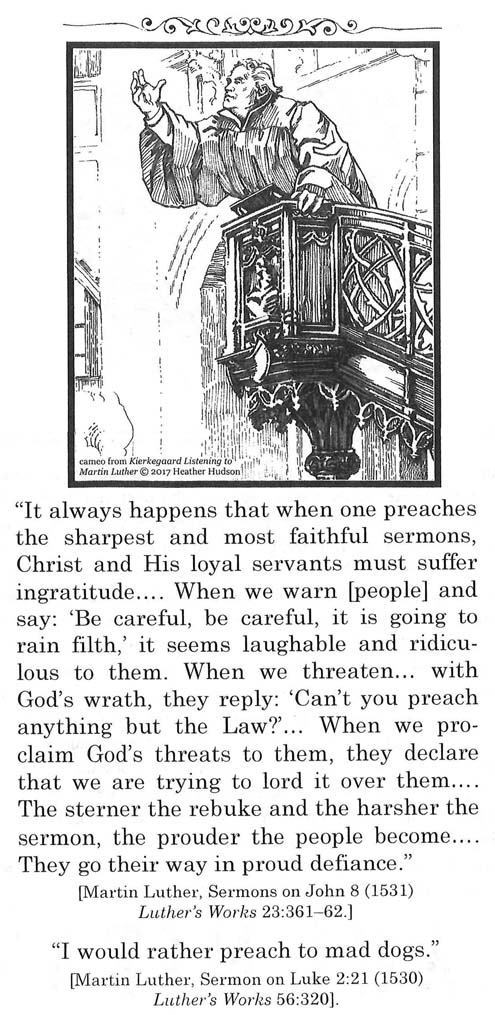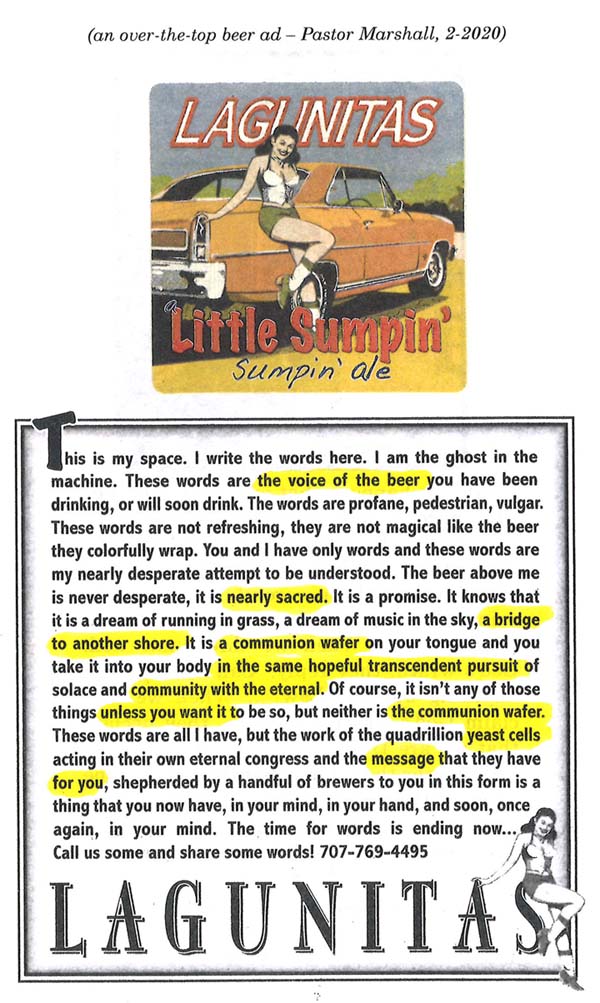February 2020
|
|
Hello again First Lutheran Church members,
We closed 2019 with an outstanding financial
performance. In
2019 our envelope giving was around $250,700 against a budget of
around $261,000.
Also, YTD through November, our operating expenses were around
$113,200 against a budget of around $98,100.
The $15,000+ overage in our expenses was predominantly
spending on the necessary maintenance of our Church building and
office supplies.
The good news is that we were able to cover these necessary
expenses from our checking rather than from savings.
We are going into 2020 with over $50,000 in our checking.
This means that we should be able to continue to grow our
major reserve accounts while paying for continuing expenses from
our checking. We
also had large designated gifts to the endowment fund and
extended ministries in 2019, not to mention the successful St.
Nicholas Faire generating over $11,000 for the West Seattle
Helpline and Food Bank. Thanks
be to God that our congregation has the ability and willingness
to give so generously in support of our church.
On a different note, I recently had a conversation with
one of our congregation members.
It was about the Bible studies and other classes offered
by Pastor Marshall.
I had not attended any of Pastor Marshall’s classes for a long
time and I have never attended a Wednesday morning or evening
Bible class. But
recently I attended Sunday’s education hour on the Book of
Esther – one of the shortest books in the Bible and one where
God is surprisingly never mentioned.
How intriguing I thought.
So I went.
I am so glad I attended the class.
This class was interesting and thought provoking.
Pastor Marshall presented different perspectives through
the use of other authors and articles relevant to the subject.
The discussion often included the difficulty Christians
have with God, how to interpret what the Scripture is telling
us, how difficult it can be to accept, and how it may apply to
the current day. It
was always a great discussion.
It is clearly evident that Pastor Marshall’s depth of
knowledge about the Bible and its teachings is great and that we
have an extremely knowledgeable and high caliber teacher of the
Scripture right here in our little church.
So I started to ask myself some questions.
Why are Pastor Marshall’s classes so poorly attended by
our congregation?
Why does Pastor Marshall spend countless hours each week putting
together the Sunday morning Education Hour and the two Wednesday
classes (one morning and one evening class), each on a different
book, for just a handful of students?
Not to mention the Home Bible studies he puts together
each month for us.
Why doesn’t our congregation want to take advantage of having
such a knowledgeable teacher who is right here in our midst?
Why don’t more council members attend these classes?
Why don’t I attend
more often? I’m
retired so I have no excuse AND I really enjoy them.
When I started asking myself all these questions I
realized I need to change my behavior.
I thought to myself ― it is one thing to support our
church through financial means and by serving on the church
council, but continuing to educate myself on the Bible and being
a Christian is just as important.
Pastor Marshall’s Bible
study is a gift we all should consider taking advantage of
whenever possible.
If I have learned one thing about Pastor Marshall, it is
that numbers and attendance don’t matter.
As long as there is one to hear, he will be there.
This is his calling and he takes it very seriously.
On Sunday, January 19, Pastor Marshall included an insert
in our bulletin entitled
House of Studies outlining all the Bible and related studies
he offers. I
encourage you to review this material and see if there is an
opportunity for which you can take advantage.
I hope to see you there! |

|
Stewardship
_________________________________________________
Helping the Poor
As we take another
look at stewardship it helps to be reminded that providing money
to the church is only one way of being a good steward.
Christians believe that everything we have belongs to the Lord
and that we are to manage these things wisely. David begins
Psalm 24 with the declaration, “The earth is the Lord’s, and
everything in it, the world and all who live in it.” All of us
are managers or administrators, of our little corners of God’s
blessings. So, stewardship and giving go hand in hand, and being
generous is one of the primary ways in which Christians reveal
the work of the Holy Spirit in their lives. Of course, this is
never easy. The tithe is not merely an Old Testament teaching,
but rather an act of joyful worship. It is worthy of working
towards. Pastor Marshall has rightly encouraged all of us to
gradually increase the percentages of our giving, as we are
able, to reach the 10% goal. And even then, who of us can say we
have given enough? When you look at the life of Christ, his
example to us all, especially during this Easter season when his
suffering, death and resurrection to conquer death and give us
life eternal are celebrated in awe, the tithe doesn’t quite seem
enough. So, it is a key point in Christian teaching that
everything we have belongs to God, because it came from God. So,
we look at other areas of stewardship as well, such as how we
use our possessions. Many of us have loaned a car to a friend or
relative when they were in need. It was probably a simple
decision, saying to ourselves, “We can live with one car for a
week,” We do this almost instinctively because it exemplifies
the work of Christ in us, but also because that car and truck
are the Lord’s. In the same vein, if someone’s home needs an
extensive repair, there are those of us who would gladly open
their home to that person during repairs. The same reasons exist
for such generosity; it springs from Christ’s work in us, and
it’s the Lord’s house anyway. Corporately as a congregation, we
demonstrate stewardship in so many ways; such as supporting the
West Seattle Food Bank and the West Seattle Helpline, the
support the El Camino de Emaus and world missions through India
Transformed. And then, of course, we believe that our time also
belongs to the Lord, and that we are to use with care the time
of which we are stewards of. We have been called as believers to
special times of rest and worship. Through Jesus Christ, all the
time God has given us is holy, set apart for God and intended to
be used for salvation, healing, and living a just life. We are
the trustees of the time, talents, gifts, treasures and the
values of the community we all live in. We have a limited time
to be good stewards of all that is the Lord’s. As Martin Luther
once penned, “I have held many things in my hands, and I have
lost them all. But whatever I have placed in God's hands, that I
still possess.” So, whether it’s giving money, serving the poor,
encouraging our brothers and sisters in Christ, or providing the
needs of those we love, remember that it’s all God’s, and that
through Christ’s example and the encouragement of the Holy
Spirit, we can practice good stewardship.
-Benjamin Dobbeck, Church Council |
 |
|
Monthly Home Bible Study, February 2020, Number 324
The Reverend Ronald F. Marshall
Along with our other regular study of Scripture, let us join as
a congregation in this home study. We will
study alone then talk
informally about the assigned verses together as we have
opportunity. In this way we can “gather
together around the
Word” even though physically we will not be getting together
(Acts 13.44). (This study uses the RSV translation.)
We need to support each other in this difficult project. In 1851
Kierkegaard wrote that the Bible is “an extremely dangerous
book.... [because] it is an imperious book... – it takes the
whole man and may suddenly and radically change... life on a
prodigious scale” (For
Self-Examination). And in 1967 Thomas Merton wrote that “we
all instinctively know that it is dangerous to become involved
in the Bible” (Opening
the Bible). Indeed this word “kills” us (Hosea 6.5) because
we are “a rebellious people” (Isaiah 30.9)! As Lutherans,
however, we are still to “abide in the womb of the Word” (Luther's
Works 17.93) by constantly “ruminating on the Word” (LW
30.219) so that we may “become like the Word” (LW
29.155) by thinking “in the way Scripture does” (LW
25.261). Before you study then, pray: “Blessed Lord, who caused
all Holy Scriptures to be written for our learning: Grant us so
to hear them, read, mark, learn and inwardly digest them, that
we may embrace and ever hold fast the blessed hope of
everlasting life, which you have given us in Our Savior Jesus
Christ. Amen” (quoted in R. F. Marshall,
Making A New World: How
Lutherans Read the Bible, 2003, p. 12). And don’t give up,
for as Luther said, we “have in Scripture enough to study for
all eternity” (LW
75:422)!
Week I.
Read Job 1.5 noting the word
continually. Why did
Job continually sanctify his sons and make offerings to God on
their behalf? On this read 1 Samuel 3.13 noting the words
punish and
restrain. Did Job
think his sons were like Eli’s sons? On this read 1 Samuel 2.12,
17 noting the line the
sons of Eli were worthless men; they had no regard for the Lord
[and] they treated the offering of the Lord with contempt.
Is that what Job worried about – and so he was trying to
restrain them by sanctifying them and making offerings for them?
But why did he think that might happen? On this read Job 1.1
noting that Job was
blameless and upright. Shouldn’t that goodness have rubbed
off on his sons? Was there any reason for Job to suppose that
this transference hadn’t occurred? On this read Genesis 37.2
noting the ill report
from Joseph to his father, Jacob, about his brothers. What was
it about? On this read Genesis 35.22 noting
Reuben’s incest with
his father’s concubine,
Bilhah. So if goodness didn’t transfer from Jacob to Reuben,
might not Job reasonably worry too about his sons?
Week II.
Read again Job 1.5 noting the little word
may. Was there a good
chance, then, that this possible infraction had happened? The
word may, then, seems
closer to likely. Is
that why he was on top of it because it already had happened
before – and Job worried about it coming back? If not, is Job
then simply neurotic? But that wouldn’t be becoming of such a
fine man! Even though there aren’t any reports of his sons
cursing God at their parties, Job acts as if there were and he
is now trying to soften the blow before it happens again. Note
that he actually sanctifies his sons after their parties – just
in case. On this realistic view of evil, see Genesis 4.7 noting
the line sin is couching
at the door. Would this sin also include lying? And does
that explain why Job doesn’t first ask his sons if they have
sinned before he sanctifies them? On this read Psalm 116.11
noting the line men are
all a vain hope – or all are liars. Pretty bad, don’t you
think?
Week III.
Reread Job 1.5 noting the same line
Job… would rise early in
the morning. Why does he get started so early covering for
his sons? On this read Acts 12.23 noting the words
immediately and
smote. Is that why Job couldn’t waste any time? But isn’t
God also slow to anger
– as in Exodus 34.6? Couldn’t that happen too? On this read
Ecclesiastes 8.11 noting the line
fully set to do evil.
Would that be a reason for God punishing quickly? On this read
Revelation 3.19 noting the fast transition from
love to
chastening. So is
delaying punishment unloving? On this read 2 Thessalonians 2.11
noting the category of
strong delusion. Is this like the
giving up in Romans
1.24? What shall we then make of God tormenting us? On this see
Romans 5.3 noting the words
rejoice and
suffering. Why would
we do that? On this read Romans 5.5 noting how suffering is
correlated with God’s
love for us. Is that only because of what the suffering
brings?
Week IV.
Read Job 1.5 one last time noting the word
hearts. Why add that
qualifier? Is it to show that what Job fears most is that his
sons sin on purpose and not inadvertently? On this read John
3.19 noting the phase men
loved the darkness. That sounds like they have their hearts
in it! On this read Ezekiel 11.19 noting the line
I will take the stony
heart out of their flesh. Read also John 3.7 noting the line
you must be born anew.
Why is this massive change needed instead of some midcourse
correction or life improvement plan? On this read Isaiah 1.6
noting the line no
soundness. Read also Romans 7.18 and the line
nothing good dwells
within me. Are such draconian solutions needed because our
diagnosis is so unremittingly bad? If our hearts are so bad, do
we need hearts of a completely different sort? On this read
Matthew 22.37 noting the line
with all your heart.
Is that what it’s like to have
one thing… needful
(Luke 14.42), instead of being distracted by
things… on earth
(Colossians 3.1)? Does Job, then, have
the mind of Christ –
as in Philippians 2.5? Is that what Job 1.5 is about?
|
|
Luther on Samson
By Pastor Marshall
Samson’s
life begins before he is born – when an angel of the Lord
appears to his parents to tell them that their son will deliver
Israel from their enemy, the Philistines – and to do this he
should never cut his hair (Judges 13:5–6). This angel, we’re
told, looked like a flame of fire (Judges 13:20). Luther called
this appearance a “union of effect” (Luther’s
Works 37:298–99). What
they saw was fire – but in it they also beheld an angel and his
message about their son. According to Luther there’s no
conundrum here for the “two kinds of being have become one.”
This double effect says that this boy will be remarkable.
|

The Body
“I am fearfully
and wonderfully made.”
(Psalm 139:14)
“You
don’t know how the body is formed in the mother’s womb.”
(Ecclesiastes
11:5)
Sleep
“Sleep is the
most mysterious thing we do. We know that it is vital; we just
don’t know exactly why…. Sleep is clearly about more than
resting…. [And] no one understands the yawn. Babies yawn in the
womb. People in comas yawn. It is a ubiquitous part of life, and
yet what it exactly does for us is unknown…. Yawning doesn’t
even correlate reliably with how tired you are…. Perhaps the
least explicable aspect of yawning is its extreme
infectiousness. Not only do we more or less yawn when we see
others do so, but just hearing or thinking about yawning causes
us to yawn.”
[Bill Bryson,
The Body:
A Guide to
Occupants
(2019) pp. 260–61, 273–74.] |
 |
|
ANNOUNCEMENTS:
NEW
MEMBER ORIENTATION
will start on Sunday, February 2nd immediately following the
10:30 am liturgy, in room D.
If you know someone who is interested in the class, have
them to talk to Pastor Marshall.
FOOD BANK COLLECTION:
Suggestions for February
are canned fruits & vegetables.
SUNDAY EDUCATION:
Cain & Abel in the
Cainite Church: Luther on Genesis 4:1-16.
This eight week
course – during February and March – will explore the
differences between Cain and Abel according to Martin Luther –
and how they help us understand the church today. Each class
session will be based on a worksheet of questions handed out the
week before.
WEB PAGE ADDRESS:
www.flcws.org.
ASH WEDNESDAY
this year will be on
Wednesday, February 26th with the Imposition of Ashes liturgy at
7 pm.
HOLY EUCHARIST
– Communion:
Those who are baptized in
the name of God the Father, Son and Holy Spirit and believe are
welcome to receive the Sacrament of the Lord's Supper.
If you are not able to walk up to communion but would
like to receive, contact the Parish Deacon
before the liturgy.
Columbarium
The Chapel of the Resurrection The
columbarium chapel was dedicated on November 25, 2001 with
forty-nine niches installed on the north wall.
All 49 of the north wall niches were sold.
In the second phase of construction another forty-nine
niches at the south wall of the columbarium were built and
completed in December of 2008.
All monies for this project were raised through the
pre-sale of the niches.
The cost of a niche is $800.
If you are interested in purchasing a niche, a payment
plan may be arranged with the church office.
We believe that this form of burial provides great comfort to
the members of our parish family. By being able to inter their
ashes in the church, a sacred resting place is provided. Burial
in the columbarium of our church is a glorious way to care for
the remains of loved ones.
If you have not yet made burial plans for yourself we encourage
you to consider a niche in the columbarium, The Chapel of the
Resurrection. Forms are available on the Narthex table and in
the church office. Call us if you have any questions. |
|
The Presentation
of Our Lord —
Sunday, February 2nd
“The divine Word is opposed by all the factions…. For Christ
must be a target or sign to be spoken against, as it is written
in Luke 2:34, and yet He is also a precious sign. Thus the
Church of God was also one and singular from the beginning, and
yet she was in great turmoil, for she had a clear and singular
doctrine. Nevertheless, they all lie in wait for us…. There is
all this ranting and raving against us, and they are madly
furious at us. This is the ‘dwelling,’ as the psalm says, ‘among
your enemies’ (Psalm 110:2). The flock that truly has God’s Word
must suffer, but the others… they can tolerate.”
(Luther’s
Works
68:265)
|
|
Remember in prayer before God those whom He has made your
brothers and sisters through baptism.
Pray for the shut-ins that the light of Christ may give them
joy: Bob & Mona
Ayer, Bob & Barbara Schorn, Joan Olson, Doris Prescott, C. J.
Christian, Dorothy Ryder, Lillian Schneider, Crystal Tudor, Nora
Vanhala, Martin Nygaard, Gregg & Jeannine Lingle, Anelma Meeks.
Pray for our bishops Elizabeth Eaton and Shelley Bryan Wee, our
pastor Ronald Marshall, our choirmaster Dean Hard and our cantor
Andrew King, that they may be strengthened in faith, love and
the holy office to which they have been called.
Pray that God would give us hearts which find joy in service and
in celebration of Stewardship.
Pray that God would work within you to become a good
steward of your time, your talents and finances.
Pray to strengthen the Stewardship of our congregation in
these same ways.
Pray for the hungry, ignored, abused, and homeless this
February. Pray for the mercy of God for these people, and for
all in Christ's church to see and help those who are in
distress.
Pray for our sister congregation:
El Camino de Emmaus in the Skagit Valley that God may
bless and strengthen their ministry.
Also, pray for our parish and it's ministry.
Pray that God will bless you through the lives of the saints:
Martin Luther, Renewer of the Church, 1546; Saint Matthias,
Apostle.
|
|
Treasury of Prayer
Dear Lord God,
help me handle money properly. I thank you for all of the life
and joy it has purchased – bread for the family table, the
saving visit of the doctor, houses for the homeless, the book
that taught the young, the support for churches and
missionaries. And I ask forgiveness for all the harm it has done
– buying booze for drunkards, guns for criminals, time from a
prostitute, and contaminates that foul nature. In the name of
Jesus I pray. Amen.
[For
All the Saints (ALPB, 1994-1996) 4 vols., IV:1158, altered] |





%20small.jpg)